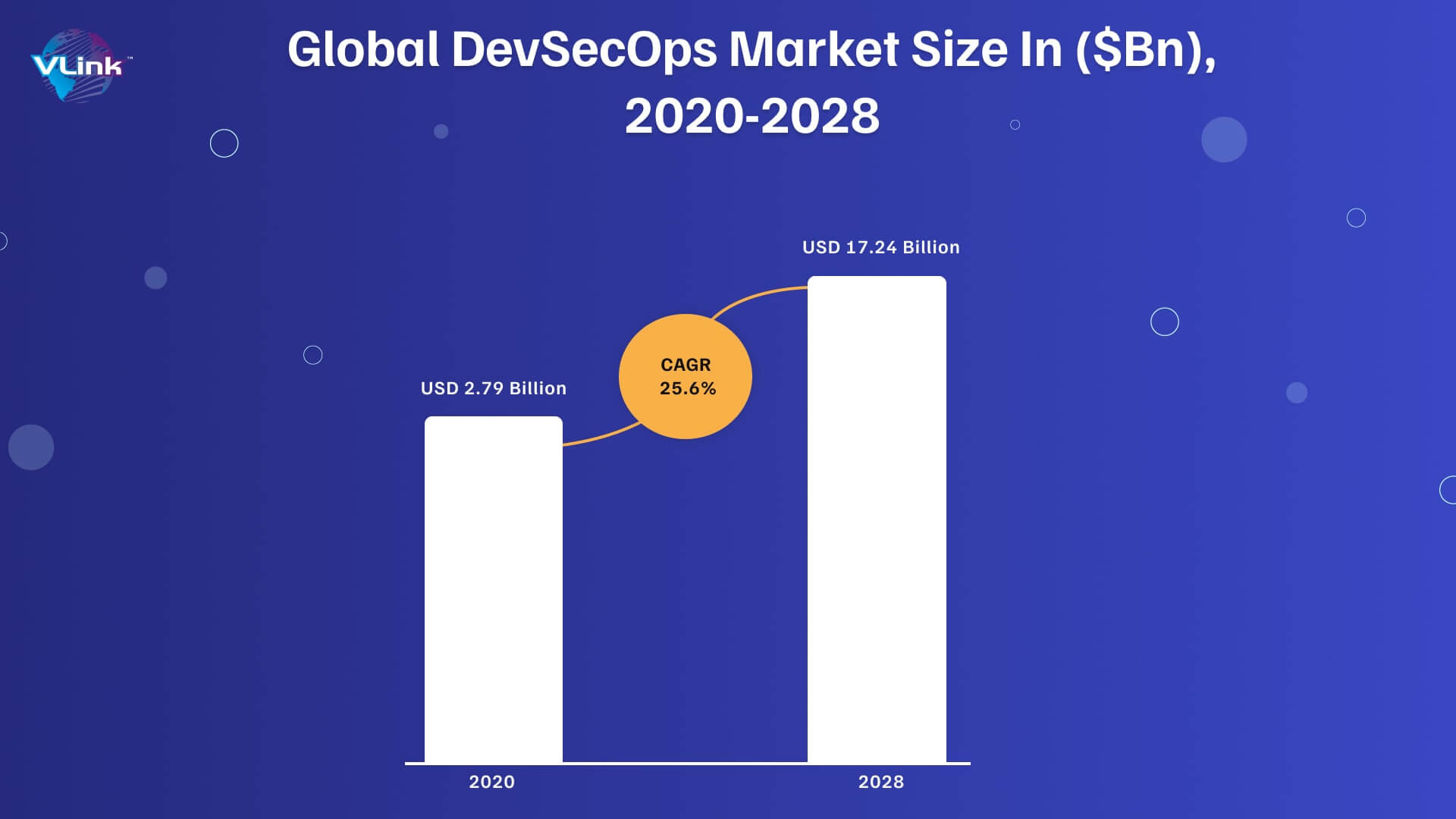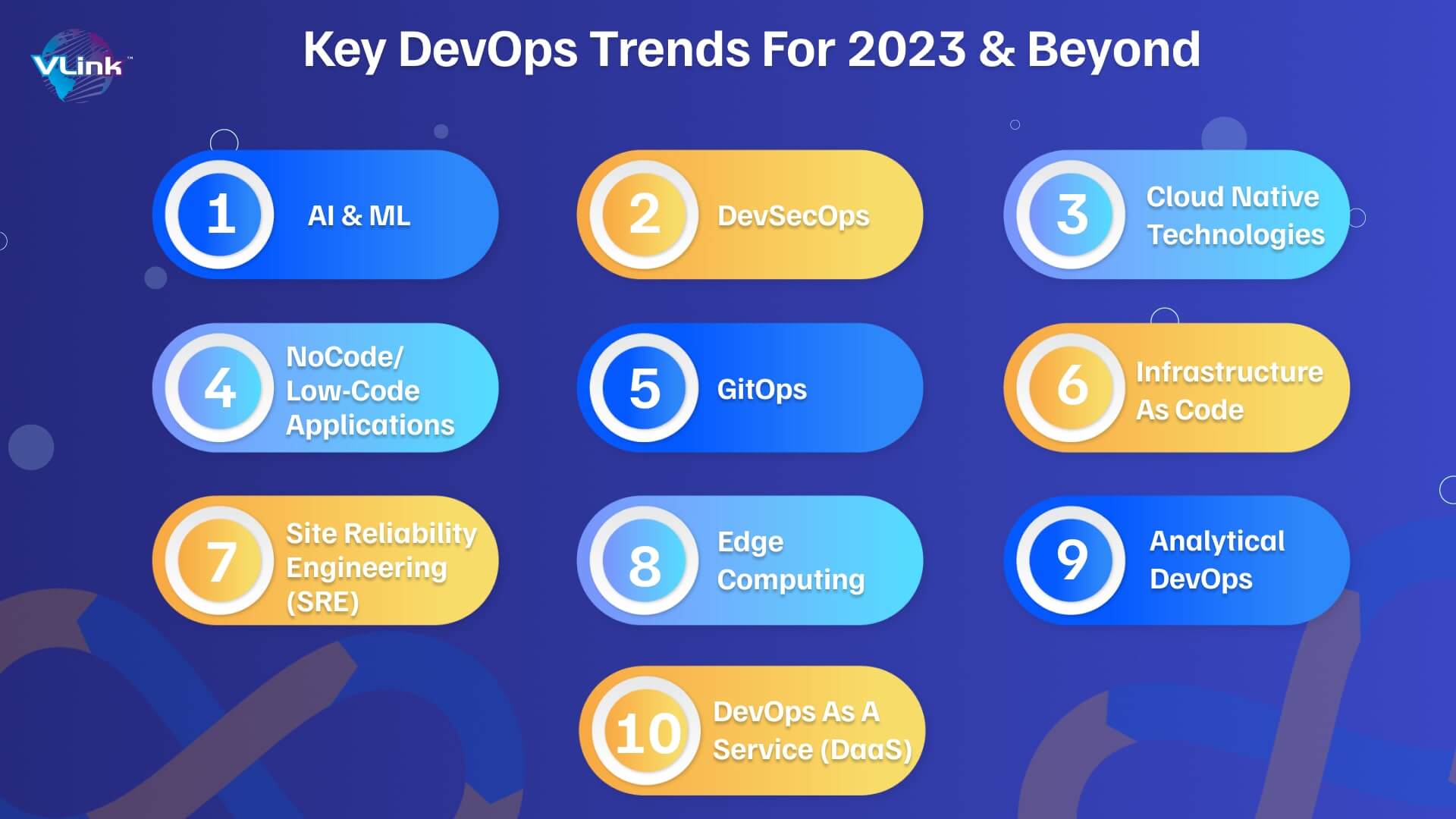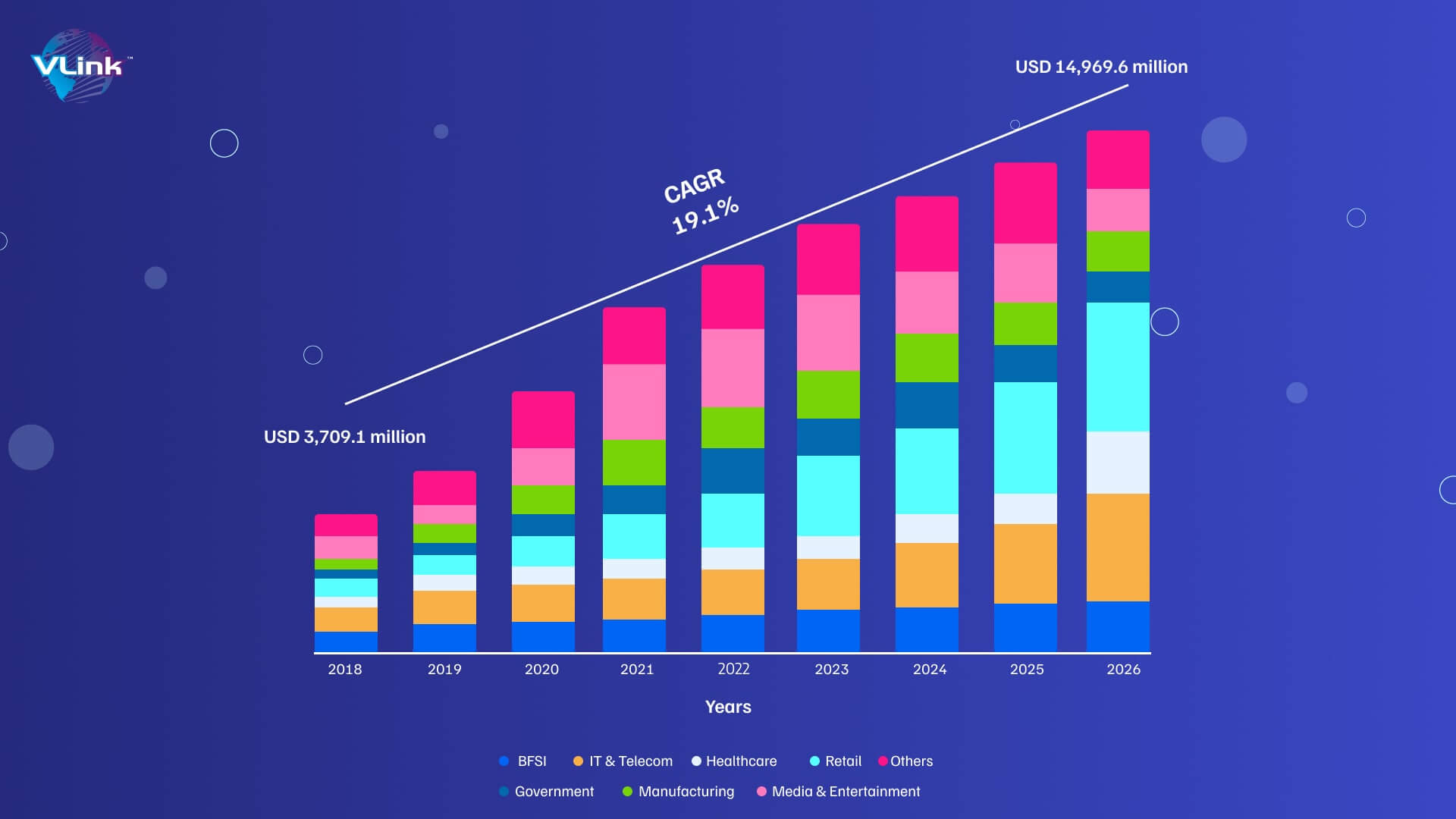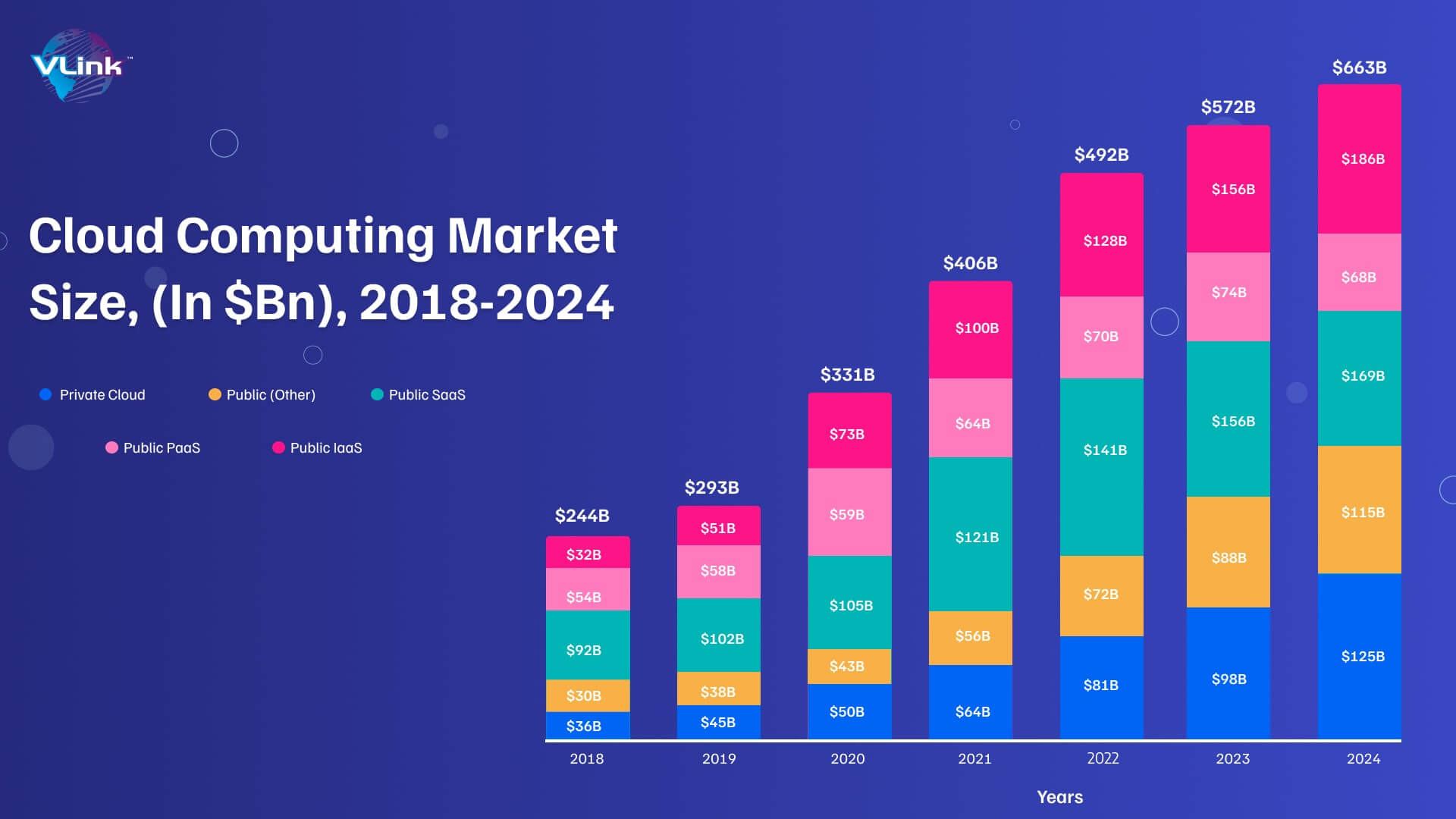DevOps is the most popular technology trend. The reason is its reliability in helping enterprises improve output, cutting downtime, and encouraging collaboration.
The survey predicted that the Global DevOps market size was valued at USD 3,709.1 million in 2018 and is projected to reach USD 14,969.6 million by 2026, exhibiting a CAGR of 19.1% (2019-2026). DevOps' contribution to the digital transformation will lead to significant changes across a wide range of businesses.

DevOps will continue to develop and be used in a variety of sectors, from pipeline automation to containers. This article will help you understand what will change in the DevOps industry in 2023 and how it may benefit your company if correctly implemented. So, let's get going!
What is DevOps?
DevOps - A combination of development and operations - increases a company’s ability to deliver web, software and mobile app development services at a faster pace than traditional processes. Thanks to this speed, organization can better serve their clients and stay ahead in the competitive market.
Here are several DevOps tools:
- Jira Software
- Trello
- Confluence
- Bitbucket
- Opsgenie
- Statuspage
- Compass
Key benefits of DevOps are;
- Faster and easier releases
- Team efficiency
- Increased security
- Higher quality products
- Satisfied teams and customers
Key DevOps Trends For 2023 & Beyond 
AIOps & MLOps are two of the most popular trends for DevOps, with the expectation that their market value will be worth $40.91bn by 2026. Both artificial intelligence and machine learning have a significant role to play in optimizing DevOps processes.

This DevOps standardizes the machine learning and AI app development services. AIOps can help you analyze the base of any issue affecting productivity. On the other hand, MLOps can help you streamline processes and improve productivity.
HCL decreased MTTR by 33% for the hybrid cloud-managed infrastructure services by adopting AIOps. PepsiCo analyzed customer shopping trends and released actionable insights with MLOps.
Leading Companies Using AIOps and ML:
- Cisco
- IBM
- Walmart
Security is one of the biggest concerns in the digital world. Most companies strive to create amazing products or services by applying security through code. DevSecOps integrates the best methods in the DevOps lifecycle to emphasize safety, observability and governance.
DevSecOps survey, 42% of teams actively use DevSecOps practices to reduce risks. As per current DevSecOps trends, 50% of enterprises use SAST test, 40% DAST, and 50% test containers and dependencies.
Example: Pokemon Go
Pokemon Go adopts DevOpSecOps to protect children’s privacy. Out of its 800 million downloads, most were from children.
Leading Companies Using DevSecOps:
- Netflix
- Microsoft
- Salesforce
- GitHub
- Atlassian
The faster your customer gets the product, the quicker you can get feedback to make your product better.
Cloud-native tools:
- Enable microservices architecture.
- Design and deploy software with much less effort and potential human error.
Here are three cloud-native technologies:
Kubernetes
Kubernetes (K8) is a portable, scalable, open-source platform that manages containerized workloads and services. Developers may scale up or down the resources thanks to the ecosystem's autonomous and continuous container-based integration.
Due to this, Kubernetes is now used for container orchestration by 48% of developers. In addition, this tool supports cross-functional cooperation and guarantees less deployment downtime, both of which are in line with DevOps best practices.
Nordstrom used Kubernetes to improve operational effectiveness and speed up deployment.
Leading Companies Using Kubernetes and GitOps:
- Spotify
- GitHub
- SpaceX
- Adidas
Docker
A technology for containerization called Docker divides apps into separate parts. Docker enables developers to swiftly build and deploy programs in a uniform format to the cloud.
A DevOps trend to watch in 2023 is the continuous enhancement of Docker's developer experience. The company is currently developing new features and tools to improve, speed, and streamline the deployment process.
Its major objective is to simplify the user interface while streamlining operations. Therefore, companies using Docker may expect to have more scalability and agility.
Serverless Computing
According to the concept of serverless computing, a company would outsource infrastructure and infrastructure-related tasks to outside parties. Serverless computing may alter the way IT organizations operate. If you are already using DevOps in your organization or are considering doing so, serverless is your best option.
The DevOps methodology has benefited greatly from the serverless computing approach. With the inclusion of operability, it has successfully bridged the gap between development and operations. The host was also able to develop, test, and deploy the DevOps pipeline code thanks to it.
In recent few years, serverless has become one of the most innovative and exciting practices for deploying software, with the serverless market growing by $30 billion by 2030. Also, more than 50% of cloud-based enterprises have adopted serverless. Autodesk minimized account-creation time by 99% after selecting serverless computing.
Organizations increasingly depend on low-code/no-code development for quick deployment in order to keep up with the demand for new apps and functionalities.
A game-changing decision, integrating a low-code strategy with DevOps gives developers better agility and a competitive edge in the quick-moving software industry.
Also Learn: Build a low code platform for your organization.
Today, many strong businesses adopt low-code DevOps, giving them agility and a competitive edge in the quick-moving software industry.
Low-code platforms, a major new DevOps trend, allow non-technical employees to build apps using an intuitive visual interface, streamlining the development and deployment process.
These are some advantages of this trend:
- Faster Development
- With the potential to extend to developers when the time is appropriate, experience and knowledge are optional.
- Prototypes and POCs (proof of concepts) are made possible, which promotes innovation.
Leading Companies Using Low-Code/No-Code DevOps Practices:
- Unilever
- Siemens
- American Red Cross
- T-Mobile
- NASA
One of the most recent DevOps innovations to be included in the workflow is GitOps. It aids in infrastructure automation and management. Developers and IT operation managers may utilize Git for merging and deploying a variety of apps thanks to a Kubernetes-based architecture.
GitOps brings to infrastructure automation all of the DevOps best practices, including version control, collaboration, compliance, and CI/CD. Additionally, it emphasizes continuous delivery and incremental releases to create, test, and deploy software quickly and effectively.
Mettle used GitOps, increasing deployment speed by 25% and production speed by 75%.
Infrastructure as Code (IaC) is a DevOps trend that aims to make developers' tasks easier by automating the time-consuming and repetitive parts of software architecture. It consolidates environment replication and administration by encapsulating configuration information in code files.
Among the many advantages of IaC include:
- Faster development.
- Enhanced consistency due to uniform application setups.
- A lower chance of mistakes.
These benefits boost the DevOps Life Cycle's efficacy and advance cost-effectiveness.
Asian Development Bank (ADB) adopted IaC to speed up VM provisioning and increase security.
Leading Companies Using IaC DevOps Services:
- Microsoft Azure
- Google Cloud Platform
- Cloudflare
- HashiCorp
- GitHub
Software engineering discipline known as Site Reliability Engineering (SRE) is used in IT operations to monitor systems, resolve issues, and automate operational chores. SRE aids in the development of highly scalable and dependable software systems.
By using SRE procedures, PayPal increases its customer satisfaction rate.
Leading businesses that utilize SRE DevOps services:
- Netflix
- Spotify
The SRE's fundamental goal is to balance deployment obligations with skill-development requirements. By incorporating failure-related learning into its services in the form of software upgrades, the SRE aims to learn from mistakes. The methodologies, which have been borrowed from the healthcare and aerospace sectors, see failures as a chance to gain knowledge by carefully examining each incidence.
Edge computing is a distributed computing architecture that brings corporate applications closer to the source of truth, such as IoT or local servers. Faster insights, quicker reaction times, and more bandwidth are advantages of this technology.
Edge computing will be employed in 5G, IoT, AI, and other areas where rapid reaction and delivery are required and where CI/CD excels, to the tune of $275 million by 2025.
Daihen Corporation doubled its plant’s output by adopting edge computing.
Leading Companies Using Edge Computing:
- Dell Technologies
- Amazon Web Services
- Tesla
- Hewlett Packard (HP)
- Intel
Software development processes are measured, monitored, and optimized using data analytics services in analytical DevOps. In order to give real-time feedback and insights into the development process, it includes gathering and evaluating data from a variety of sources.
DevOps as a Service, which enables businesses to access DevOps tools, techniques, and knowledge on demand, will continue to grow in popularity. Adoption will be made simpler for companies of all sizes as a result.
What is the Future of DevOps?
The sector will only expand and become more open to new participants as companies continue to see the value of DevOps and devote more resources to it.
The following are some potential benefits that DevOps may provide in the future:
Automation
DevOps process automation may assist in saving costs, increase productivity, and enable a speedier time to market. Manual processes like testing, deployment, and monitoring may be automated to free up resources for more crucial work. Additionally, automation enables businesses to make quicker, more informed decisions.
Cloud Computing

Through the use of the cloud computing services for businesses, they may access and utilize the massively distributed networks' processing capacity for their DevOps requirements. Physical servers are no longer necessary, thanks to cloud computing, which can also grow to match an organization's changing demands.
Based on Industry and Location
The future of DevOps is mostly determined by industry and region. As companies transition to more agile, cloud-based, and automated service solutions, DevOps is becoming more and more significant in various sectors, such as banking.
In contrast, DevOps is still a relatively new idea in some industries, like the healthcare industry, and the adoption of the culture is still in its infancy.
The Final Thought!
The DevOps trends for 2023 will motivate several businesses to establish and meet their DevOps objectives. VLink can assist you in leveraging DevOps trends by automating your release process, accelerating time to market, and minimizing mistakes. We provide:
- DevOps and cloud-native solutions.
- A strategy and architecture for containerization.
- Monitoring and production support.
Additionally, our dedicated team of professionals can assist you with the modernization, bug repairs, and feature upgrades of your applications, as well as scalable frameworks for hybrid cloud infrastructures. Please find out how we can implement an agile, safe development approach for your company. Contact us now!
Frequently Asked Questions
DevOps accelerates digital transformation by fostering collaboration, automating processes, and enhancing software delivery. It bridges development and operations, enabling agility, efficiency, and continuous improvement in delivering digital services.
Implementing DevOps and automation solutions streamlines operations, reduces manual errors, accelerates software delivery, enhances scalability, and fosters collaboration. These benefits boost efficiency, reduce costs, and drive innovation, making it essential for modern businesses to stay competitive.
There are top challenges of implementing DevOps with their solution:
- Cultural Resistance: Foster a culture of collaboration and communication.
- Legacy Systems: Gradually refactor or replace outdated systems.
- Complexity: Start with small, manageable changes and scale gradually.
- Tooling Overload: Select and integrate tools wisely to avoid redundancy.
- Security Concerns: Integrate security throughout the DevOps pipeline (DevSecOps).
- Skill Gaps: Invest in training and upskilling your team.
- Measuring Success: Define clear KPIs and continuously monitor and improve processes.






